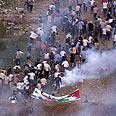
Fighting Israel’s soft war
Op-ed: War of attrition against Jewish state cannot be won with Israel’s current approach
A massive fly-in of pro-Palestinian supporters into Ben Gurion airport is the most recently announced anti-Israeli provocation. It is yet another ostensibly non-violent act by some of Israel’s enemies for which authorities will have to find an adequate answer.
Israel tries to fight such “non-violent” attacks - which aim to lead to the country’s de-legitimization - on an ad hoc basis as best as it can. The initiative in these provocations always lies with its enemies.
Their conceptual approach is simple: Non-violent initiatives against Israel that prove largely unsuccessful are abandoned. Those which garner any significant results are repeated. Some protesters managed to crossinto Israel on Nakba day. A few provocateurs were killed, prompting several condemnations of Israel by Western politicians. This result was considered satisfactory by Israel’s enemies, and thus similar efforts were made again on Naksa day.
In May 2010, a flotilla of terrorist supporters masking as human rights fans was prevented from reaching Gaza. Yet the killing of nine activists, seven of whom had expressed their desire to become martyrs, gave Israel much bad publicity. In view of the global condemnations, a new flotilla with many more ships may arrive in the coming weeks. Some observers claim that regardless how Israel reacts, it will lose in the theater of world opinion. For provocateurs this is an ideal project.
All this is part of the largely non-violent war of attrition against Israel. Such an asymmetric war is not winnable with Israel’s current approach. There are several reasons for this. The initiative always remains with its enemies, and international law is often interpreted in ways that favor terrorists and provocateurs above democracies.
In addition, the unbounded right of free speech includes extreme defamation and major lies, which help Israel’s enemies. Furthermore, the physical risks taken by the anti-Israeli provocateurs are rather minor. If they were to apply these same methods against Muslim countries, many more would die, as we witness in what some diehards still refer to as the “Arab Spring.”
There is also an Israeli component that explains why this war is not winnable at present. Israeli governments have understood very little about non-violent war in the post-modern era. Treating these attacks on an ad hoc basis cannot produce satisfactory results.
Better intelligence needed
After the 2001 United World Conference against Racism in Durban, the policies of systematic de-legitimization of Israel were formulated in a multiple point program. It included the creation of worldwide solidarity against Israel as “a bastion of apartheid,” the use of universal law mechanisms, discrediting the law of return and replacing it with a law of return for Palestinian refugees, reinstating the Arab boycott and trying to impose a much wider international boycott of Israeli activities.
The enemies’ aim is that this should ultimately lead to the breaking of diplomatic relations with Israel, while punishing those who maintain such relations.
Today this seems like a rather rudimentary approach. It has since been extended in many directions through, for instance, the distortions of the use of language, falsification of history, and intentionally misinterpreting archaeology.
In principle, each of these methods can, in the present world mood, be used against any democracy. The Danes had a little taste of it after a daily there published the Mohammed cartoons in 2005.
However, Israel is by far the main target of non-violent aggression. That puts upon it the highly problematic onus of continuously inventing creative methods to repel these attacks. Much of what is done in this area at present consists of efforts in specific fields. It is to a large extent carried out by private bodies. Some are major Jewish organizations. Others are grassroots groups. Camera, Honest Reporting, the Jerusalem Center for Public Affairs, Memri, Palestinian Media Watch, Scholars for Peace in the Middle East and NGO Monitor are a few of the ones among the many which come to mind.
Yet even if all these bodies operated in an integrated way, one would still consider the defense system of Israel against this non-violent war akin to Swiss cheese that in many areas has more holes than cheese.
The non-violent war is of a different nature than the physical one, but with the similar aim of destroying Israel. As it is a war it cannot be fought by bureaucratic ministries even if combined with private organizations.
In such war, an intelligence agency must play a far more crucial role. It has to collect systematic information about Israel’s non-violent enemies, analyze their methods and what they may do next, and regularly produce creative ideas to expose and fight the attackers. As in any other field, the knowledge and skills needed to accomplish these tasks only accumulate over the years.
This approach should have started - at the latest - in the early 1980s after the war in Lebanon, when de-legitimization of Israel accelerated. None of the successive Israeli governments has properly fought the non-violent war or even understood it in substantial detail. That makes it even more urgent to start dealing with this in a far more systematic way.
Manfred Gerstenfeld is Chairman of the Jerusalem Center for Public Affairs
- Follow Ynetnews on Facebook










